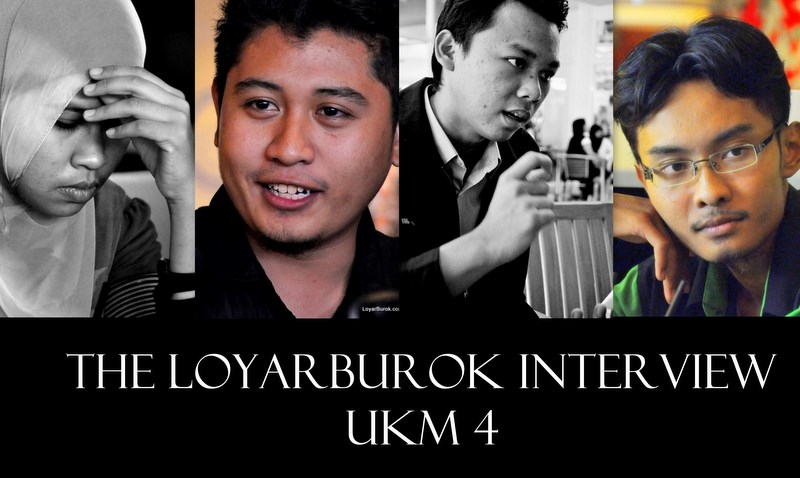The Kuala Lumpur High Court on 28th September 2010 dismissed a challenge by the infamous UKM4 against the constitutionality of section 15(5)(a) of the Universities and University Colleges Act 1971 (Act 30).
The full judgment is here.
According to the judgment, the 4 political science students, Muhammad Hilman bin Idham, Wong King Chai, Muhammad Ismail bin Aminuddin and Azlin Shafina binti Mohamad Adza, had been found in the constituency of Hulu Selangor during the campaign period for the parliamentary by-election there.
As a result, disciplinary charges were brought against them by the University alleging they had breached section 15(5)(a) of the UUCA which provides that no student “shall express or do anything which may reasonably be construed as expressing support for or sympathy with or opposition to any political party, whether in or outside Malaysia”.
Article 10(1)(a) of the Federal Constitution, which the students argued (through their lawyers Malik Imtiaz Sarwar, Haris Ibrahim and Ashok Kandiah) were infringed provides that “Every citizen has the right to freedom of speech and expression”.
However, this right is subject to Article 10(2)(a) which provides that Parliament may by law impose “such restrictions as it deems necessary or expedient in the interest of the security of the Federation or any part thereof, friendly relations with other countries, public order or morality and restrictions designed to protect the privileges of Parliament or of any Legislative Assembly or to provide against contempt of court, defamation, or incitement to any offence”.
As in the Sisters in Islam and March 8 book banning cases, and the case of Nor Hisham Osman, the recent series of Federal Court decisions culminating in Sivarasa Rasiah’s case was relied on heavily by counsel for the students. In that case, among other things, the Federal Court held:
“The correct position is that when reliance is placed by the State to justify a statute under one or more of the provisions of Article 10(2), the question for determination is whether the restriction that the particular statute imposes is reasonably necessary and expedient for one or more of the purposes specified in that Article.”
However, the learned Judge in the UKM 4 case instead relied on a much earlier Supreme Court decision in Pung Chen Choon (1994), and held that so long as the “impugned law in pith and substance is a law relating to the subjects enumerated under the permitted restrictions” set out above, “the question whether it is reasonable does not arise and the law would be valid”.
The High Court also agreed that the restriction imposed by section 15(5)(a) is necessary or expedient to maintain discipline of students (a part of public morality) and to address the potentiality for disturbance of the life of the student community in institutions of higher learning, which can amount to a disturbance of public order and the tranquility of society. As the prohibition applied across the board to all students, it was held that there was no unlawful discrimination.
The 4 students were also ordered to pay the costs of the Minister for Higher Education and the Government of Malaysia (represented by Senior Federal Counsel Noor Hisham bin Ismail, Shamsul Bol Hassan, Aida Adha Abu Bakar and Rohaiza Zainal) and those of Universiti Kebangsaan Malaysia (represented by Shafee Abdullah and Sarah Abishigam).
It seems to me that the requirement for restrictions on fundamental liberties to be “reasonable” imposed by the Federal Court in Sivarasa Rasiah seems now to be on shaky ground. It would be interesting to see what the appellate courts have to say on this, if the students dare to risk an appeal (a substantial risk given the order for costs against them, and the risk of further costs should they not succeed in any appeal). In the meanwhile, it looks like our students (even those studying political science) must continue to live with the shackles of an unreasonable and draconian restriction on their right to play a role in the governance of this country.
LB: K. Shanmuga didn’t study in Malaysia. He went to England where he was allowed to be politically active in university, and may well have been able to join Kelab MIC if he wasn’t wasting so much of his time on other (ahem) pursuits. Obviously, there is a good reason why Malaysian university students abroad can express support for a political party (presumably as long as it is a BN political party) but Malaysian university students studying in Malaysia cannot. I thought Malaysia Boleh?



personally the 4 students shld proceed to appeal if they have the conviction th their rights have been trespassed/not preserved by the power be it.as suggested if everyone donated RM1/- each in response to their appeal for funds from all citizens/residents of this afterall malaysians have donated generously to help other countries in trouble why not for your own country boys?we shld all continue to fight for a clean and just courts of law and government for all malaysians and th. is why we lawyers are here for in the first place!!!no fight no gain!
BTW why dont u start a fund to goe for appeal among the students themselves? From all over Malaysia. Even if each one give one ringgit. Imagine the show of support? That is if the students are aware that their political right have beeen taken away by the ruling elites…including their university managemement..
Keturunan Jebat
Dummies,
that is why we don't have leadership among our young people… This is about control…Pure n simple
Keturunan Jebat.